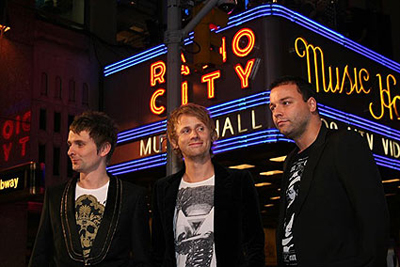Revelations And Resistance: The Music Of Muse
Published on November 29th, 2009 in: Culture Shock, Current Faves, Issues, Music, OMG British R Coming |By Lisa Anderson
I’ve loved British things all my life, but my most recent discovery is the band Muse.

Muse at the VMAs, September 2009
Photo © MuseAdmin
I first heard them three years ago. Grimey’s New and Pre-Loved Music in Nashville was having a release party for Black Holes and Revelations, the band’s fourth studio album. Not knowing much about them, I nevertheless accompanied my best friend and my boyfriend at the time, who were both quite excited about it. Any trip to Grimey’s is fraught with shiny distractions, but I liked what I heard of the album well enough to pick it up.
When I finally listened properly, it was an epiphany. While Muse has been compared to Coldplay, Radiohead, and Queen, they were not quite like anything I’d heard before (or have heard since). I know now that their sound is considered a fusion of many styles, including progressive and alternative, but I would have called it both rock and electronica at once. They use piano, synthesizer, and bass guitar to create a gorgeous, nuanced wall of sound. It’s somehow old school and fresh at the same time. This is all set off by singer Matthew Bellamy’s unique vocals, which incorporate falsetto and vibrato.
Muse, “Starlight”
One obvious thing about Muse is how political they are. Black Holes and Revelations begins with “Take a Bow,” a scathing indictment of the Bush/Blair coalition. You’ll burn in Hell, you’ll burn in Hell, tremulous vocals warn, you’ll burn in Hell for your sins. The song goes on to observe, Our freedom’s consuming itself. Later songs include references to “demonocracy” and spy satellites. Even the less explicitly political songs often trade in themes of repression and freedom. You electrify my life, Bellamy sings in “Starlight,” Let’s conspire to ignite, all the souls who would die just to be alive.
Black Holes and Revelations was part of the soundtrack of my life for that next year. I strongly associated it with the early buzz around Cillian Murphy’s movie Sunshine. When I visited London in January of ’07, in part to see Murphy onstage, I picked up Muse’s Absolution and their two-disc live album, Hullabaloo, at another used CD store. I still remember the train ride back from seeing Stonehenge in Salisbury, watching the British countryside pass outside the window as night fell, and drifting in and out of sleep with Hullabaloo playing over my headphones.
I had the good luck to see Muse in concert twice in that year. The first time, they were the headliners at War Memorial Auditorium. I stood near the front with my best friend, and we both wrote Muse lyrics all over our arms and legs with a Sharpie. That show was all bright, colorful lights, video screens, and a feeling of close interaction with the band. At the next concert, they were the opening act for My Bloody Valentine at the Municipal Auditorium. I sat in the stands that time, further away, and the main thing I remember was the band in a simple spotlight, and guitar riffs that filled up the darkness.
Toward the end of 2007, however, I was going through a rough period professionally and personally. I ended up listening to Black Holes and Revelations and Absolution in the car on my way to work. After various aspects of my life exploded all at once, I put those albums down, for the most part, for a long time.
Then, in September, I was online one night and saw that Muse had a new studio album out, The Resistance. I listened to snippets of the first few songs that the band had made available, Googled the full lyrics on those—and I was hooked. I couldn’t even wait to go to the store: I gleefully and legally downloaded it as soon as I could.
Pages: 1 2
One Response to “Revelations And Resistance: The Music Of Muse”
April 12th, 2010 at 11:33 am
[…] Revelations And Resistance: The Music Of Muse, Popshifter November 29 2009 Blog […]
Time limit is exhausted. Please reload the CAPTCHA.